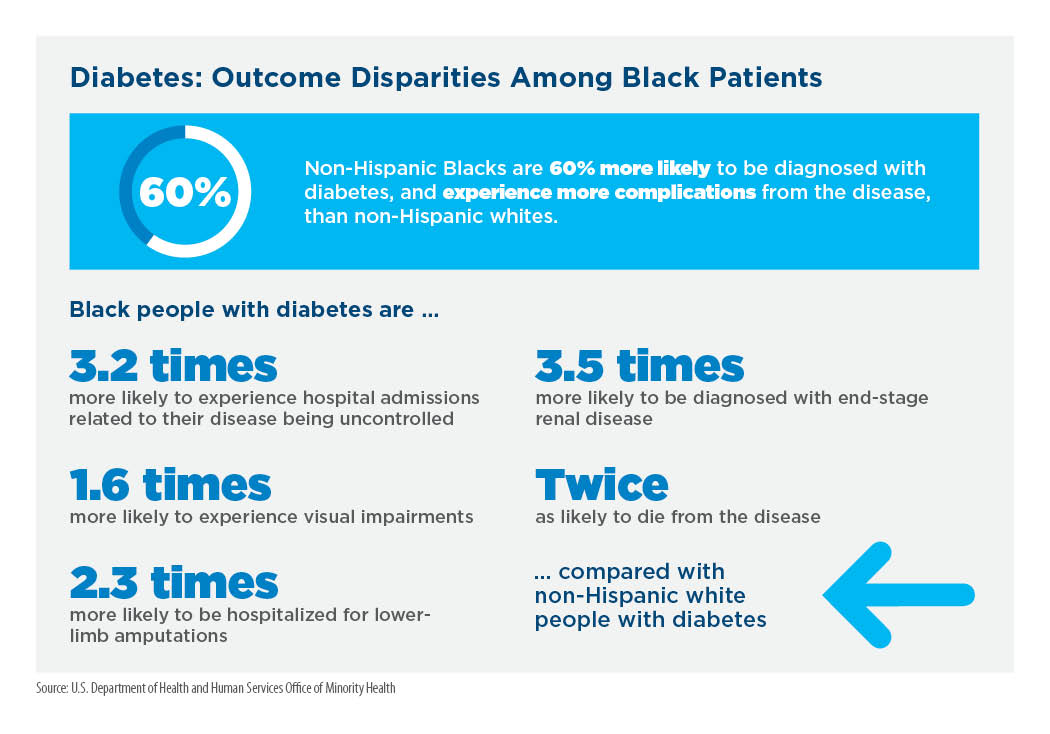Building cultural competency among health care providers is key to making diabetes management easier for Black patients.

The average person living with diabetes makes around 300 decisions related to their disease management every day, in addition to their regular decision making. Diabetes can be challenging to manage for everyone who lives with the disease, and there can be unique challenges faced by people in certain demographic populations.
For example, research shows that Black people are 60% more likely to be diagnosed with diabetes than non-Hispanic whites. What’s more, Black people living with diabetes experience more complications from the disease, and are twice as likely to die from diabetes, than their white counterparts.
In many cases, these disparities may be driven by implicit bias – also known as “unconscious bias” – that exists in the U.S. health care system. Implicit bias can lead to unfair discrimination during patient visits, even despite the health care provider’s best intentions. It can affect patient assessments and treatment recommendations, which can be less effective when individual cultural beliefs, financial situations and psychosocial factors are not taken into account. Such bias can also lead to a lack of trust and communication between patients and care providers in future medical encounters. These consequences can hinder successful diabetes prevention and management.
Building cultural competency in health care can help make a difference. Health coaches and health care providers who offer a culturally appropriate treatment plan can help make diabetes management easier for Black patients, which can improve treatment adherence and lead to better outcomes. In addition, Black patients with diabetes are more likely to be trusting and receptive of treatment advice from a provider who understands and considers their culture and beliefs, lifestyle and circumstances, and issues and challenges they face.
To help advance cultural competency, Cigna has developed a specialized training program and educational resources to aid health care professionals in better meeting the specific health care needs for Black people living with diabetes. Cigna health care professionals who are Black were involved in the development of these tools, leveraging their unique health care experiences in addition to their expertise.
Cigna clinicians who have used these tools reported improved diabetes management interactions with Black patients, and Cigna now offers these same resources to network providers so they can enhance the cultural competency of their practice.
Cultural Competency Is Key to Effective Diabetes Care
Culture affects health care by informing an individual’s:
- Concepts of health and healing
- Attitudes toward health care providers
- Perceptions of illness, disease, and their causes
- Health-related behaviors
Cultural competency is the ability of a heath care provider to understand, communicate with, and effectively interact with people across cultures.
Key attributes of cultural competency include:
- Being aware of one’s own world view and implicit biases
- Developing positive attitudes toward cultural differences
- Increasing knowledge of different cultural practices and world views
- Evolving skills for communication and interaction across cultures
Since culture plays an important part of how a person views their body and nature of illness and disease, culture is equally important to effective delivery of health services. With cultural competence, diabetes health care professionals can better understand how an individual’s culture influences their health, and how to take that culture into consideration when creating treatment plans. Culturally competent care often results in better outcomes for all patients and promotes greater health equity.
Tailored Tools and Resources Aim to Enhance Cultural Competency in Diabetes Care
To help address the health care needs of Black people with diabetes, Cigna created a specialized training course designed to help raise awareness of these needs among staff clinicians, as well as provide cultural insights and potential solutions to help them address social barriers and improve care. These clinicians, who serve as either health coaches or case managers, reported that this training increased their level of confidence and helped them feel more comfortable discussing a customer’s cultural background, dietary customs, and beliefs as they relate to diabetes management.
Given the benefits of this training with their staff clinicians, Cigna adapted it into an educational module and video series for network providers who want to enhance the cultural competency of their practice. These tools are available on a dedicated webpage which is continuously promoted to Cigna network providers via quarterly newsletters and other regular communications.
“Health care providers are working harder than ever to improve the health of their patients living with diabetes. This is even more critical in the era of the COVID-19 pandemic, which is disproportionately affecting minorities with diabetes, who are already at the greatest disadvantage.”Dr. Nicole Saint Clair, medical director for consumer health engagement at Cigna
"The tools we have developed serve as a wonderful resource for providers, giving them a framework to better identify where cultural practices and beliefs may be affecting disease management," Dr. Saint Clair added.
The webpage for network providers also offers information to empower customers, their family members, and caregivers to have open dialogues with their care providers about any biases and other challenges they experience during their care, as well as make the most of their doctor appointments and overall diabetes treatment plan.
“While not the sole solution, these cultural competency training materials foster cultural humility and facilitate better communication between health care providers and their Black patients,” said Dr. Neema Stephens, national medical director for health equity at Cigna. “These are important steps to overcoming implicit bias.”
Cigna’s cultural competency tools help improve the services of their health coaches, specialty case managers and network providers by:
- Enhancing their knowledge and understanding of the Black patient population.
- Enabling them to better provide recommendations and locate community resources to help Black patients with diabetes address the disparity challenges they face, including social determinants of health.
Cultural Competency Informed by the Experience of Black Cigna Employees
The cultural competency training and public resources were developed by a team of Cigna experts and employees that represent a wide range of roles and expertise throughout the organization, including dietitians, nutritionists, exercise physiologists, health engagement analysts, account implementation advisors, and utilization review nurses. Several team members are part of Cigna’s African American/Black Enterprise Resource Group, which empowers Black employees to share their experiences, thoughts, concerns, and ideas with Cigna to improve business and community practices, including ways to eliminate unjust barriers in health care. The cultural competency work is aligned to the goals of the Health Equity Committee of Cigna’s Diversity, Equity and Inclusion Council, whose mission is to ensure that all people have the opportunity to achieve their full health potential regardless of social, economic, or environmental circumstances.
“The team came together to develop these culturally competent tools in order to help reduce inequity in the incidence, management, and prevalence of diabetes in the Black community.”Dr. Neema Stephens, national medical director for health equity at Cigna
“Even in the midst of the COVID-19 pandemic and the changing demands of their work and home life, and during the civil unrest following the deaths of George Floyd and Breonna Taylor, this team continued to find strength, purpose, and momentum to complete this special project,” she added.
More Resources to Address Cultural Needs
In addition to the cultural competency resource portal, Cigna network providers can take advantage of discounted rates on language assistance and interpretation services. They also have access to a curated cultural insight center that provides detailed information on dozens of cultural communities and their perspectives on communication and etiquette, diet and nutrition, appropriate treatment protocols, and more.
Further Steps to Reduce Bias and Health Inequities
Cigna is continually exploring ways to improve cultural competency in care and advance health equity. In addition to the Black diabetes resources, similar cultural competency web pages for Asian and Hispanic/Latino customers are in development and expected to be available by the end of 2022.
We plan to examine the effectiveness of these resources in improving both patient-provider relationships and health outcomes. The insights from this research will inform opportunities to further expand staff and provider education initiatives aimed to reduce implicit bias in health care. Cigna is also using data analytics to identify communities that have greater social needs in order to deliver cultural competency resources to local providers.
There is still much work to be done to reduce health inequities, and we will continue to work closely with providers, clients, and customers to address unmet social needs and improve access to care for all of the people they serve.

Health Disparaties in the Black Community
Black Americans experience significant disparities with chronic conditions, access to care, and more.


